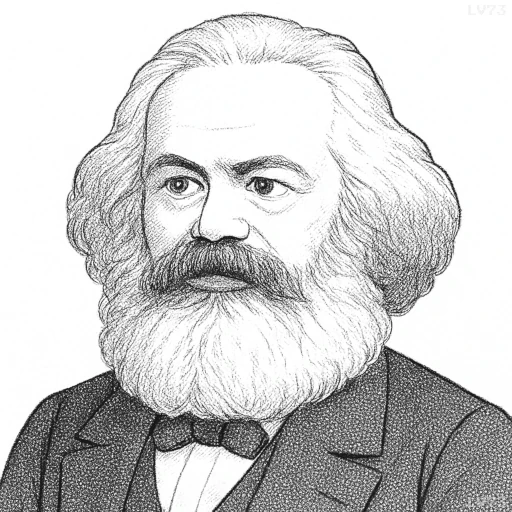“The writer must earn money in order to be able to live and to write, but he must by no means live and write for the purpose of making money.”

- May 5, 1818 – March 14, 1883
- Born in the Kingdom of Prussia (Germany)
- Philosopher, economist, political thinker
table of contents
Quote
“The writer must earn money in order to be able to live and to write, but he must by no means live and write for the purpose of making money.”
Explanation
In this quote, Marx reflects on the complex relationship between artistic or intellectual labor and the demands of the capitalist system. He acknowledges that, in order to survive and be able to produce work, a writer (or any creative individual) must earn money. However, Marx emphasizes that the writer should not allow the pursuit of money to become the primary motivation for their creative work. Writing and art should be driven by genuine expression, intellectual engagement, or social critique, rather than being reduced to a commodity produced for profit. The quote highlights the tension between creativity and commercialization, where artists are often pressured to conform to market demands in order to sustain themselves, at the cost of their artistic integrity.
Historically, Marx’s analysis reflects his broader critique of how capitalism distorts human labor and creativity. Under capitalism, art and culture are often commodified, meaning that the value of creative work is determined by its ability to be sold, rather than its intrinsic worth or its potential to challenge societal norms. The capitalist system turns art into a commodity like any other, subjecting it to the same profit-driven imperatives as other industries. In this context, artists may find themselves writing or creating work that caters to market tastes rather than pursuing their true creative vision. Marx believed that true freedom of artistic expression could only exist in a society where material needs were met and where creators could engage in their work without the constant pressure of commercialization.
In modern society, this conflict between art and commerce continues to be relevant. Many contemporary writers, musicians, and artists struggle to balance the need to make a living with the desire to create work that is meaningful and authentic. The rise of corporate media and the gig economy often forces creators to produce content that will attract audiences and generate revenue, leading to a tension between creative freedom and marketability. Marx’s idea challenges us to consider how economic systems shape not just the material conditions of life but also the very nature of human creativity, and whether a world more focused on human needs than profit might allow for richer and more meaningful cultural production.
Would you like to share your impressions or related stories about this quote in the comments section?
